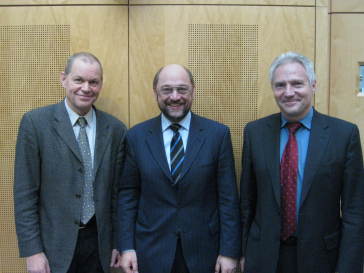IEP Lunch Debate with Martin Schulz: “2010 – European Year of the Fight against Poverty and Social Exclusion”

IEP Lunch Debate in cooperation with the Friedrich-Ebert-Stiftung (FES) with Martin Schulz, MEP, Chairman of the S&D Group in the European Parliament, on 10 December 2010 at the Friedrich-Ebert-Stiftung, Berlin.
Dr. Alexander Kallweit, Director of the International Dialog division of the Friedrich-Ebert-Stiftung, greeted participants and introduced the theme of “2010 – European Year of the Fight against Poverty and Social Exclusion”, a topic worth addressing even in light of many other important current events.
Dr. Hartmut Marhold, General Director of the Centre international de formation européenne (CIFE), emphasized in this introduction that the theme for 2010 refers to the European model of society, not least because widespread poverty is an issue of solidarity. The European Union (EU) specializes in creating regulations, but falls short in practice. The history of Europe can primarily be viewed as a success in light of the economic and currency union as well as the common domestic market, but the context in which solidarity can be identified remains to be seen.
Martin Schulz presented sobering figures regarding the European Year of the Fight against Poverty and Social Exclusion. The financial crisis had an effect on society that resulted in a growing disparity between the rich and poor. For this reason, the European Parliament resisted budget cuts that affect social security systems and cultural policy. Thanks to support across party lines, systematic exclusion was avoided. This was especially important, as the crisis had primarily affected not only those living in poverty but also those in the middle class. Without this action, more widespread poverty may have resulted.
Discrimination against those living in poverty is undemocratic, continued Schulz, and the accompanying cultural exclusion promoted through xenophobic behavior by politicians. This is evident in many countries in the EU. More financial resources must therefore be invested in the fight against poverty. Schulz named education, structural support of suburbs, and the fight against child poverty as necessary measures. Social security is handled by member states, but the EU also has some responsibility in this area. The EU is working towards a consistent economic standard and has almost achieved it, but in terms of the social state, this goal has still not been reached. The EU must therefore set the goals toward which member states can aim their efforts to reach the goal of common social standards. In conclusion, only an open society is capable of preserving democracy.
Schulz observed that gender equality is an important requirement in the fight against poverty and social exclusion. Equal pay for equal work must be ensured; otherwise, labor migration could undermine existing social standards. The introduction of a European minimum wage is also important in this context. The increased coordination of European economic policy is one of the greatest challenges for the EU member states. This means that the EU requires economic governance. This was already developed in theory through the Commission, but the last step still remains: to name this institution as an official governing body and to let it operate as such. Even though the EU does not have the power for further reforms at the moment, according to Schulz, social policy cannot be put behind economic policy. To illustrate this, he used a metaphor: If one were to push the gas pedal in terms of economic policy while hitting the brakes on social policy, the EU would go into a skid. This is all the more reason not to push the coordination of 27 different social systems into the background. Last but not least is the deepening importance of the EU, as globalization may lead to competition among world regions which only a unified EU would be able to withstand. Thus, financial solidarity is crucial, as monetary policy will also be a part of this global competition. It should not be forgotten, on a positive note, that the Euro is still a stable currency.
The current shortcomings of the social state may provoke protests among citizens. The connection between an economic downturn and extreme reactions should not be overlooked. According to Schulz, this raises the question of which democratic controls may be able to discourage nationalist tendencies. To illustrate the point, Schulz closed with a quote from the philosopher Edmund Burke: “The only thing necessary for the triumph of evil is for good men to do nothing.”
By Anthony Baumann

